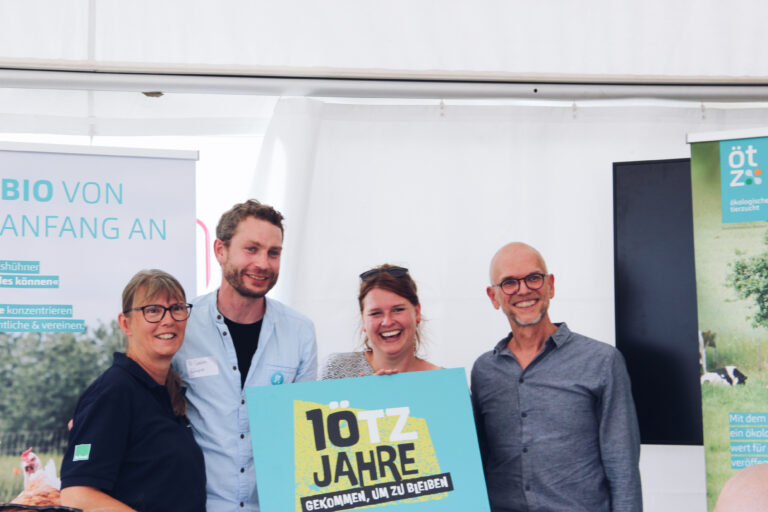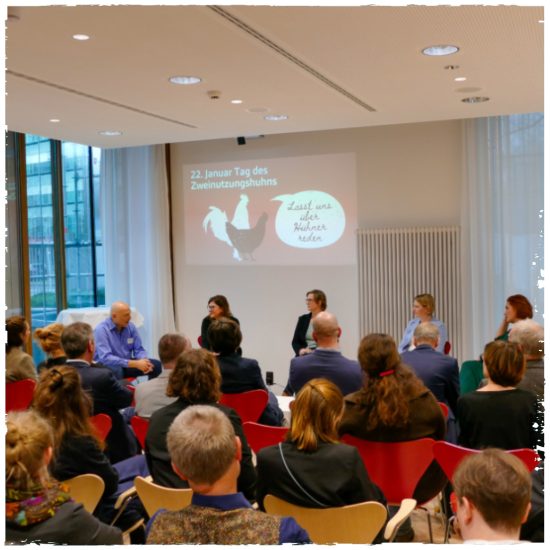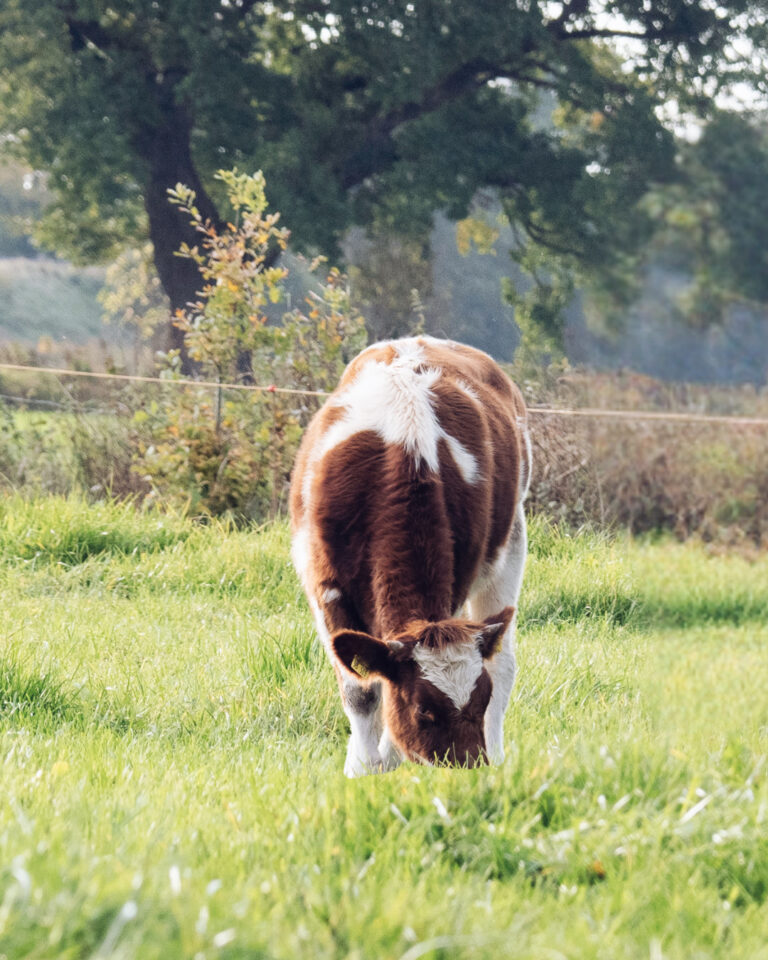
10 Jahre ÖTZ – Jubiläum auf den Öko-Feldtagen 2025
10 Jahre ÖTZ – unser Jubiläum auf den Ökofeldtagen 2025

On the occasion of Dual-purpose Chicken Day, which took place for the third time on 22 January 2024, a prominent panel* discussed the next steps on the way to the organic chicken of the future at the Lower Saxony State Representation in Berlin. NEULAND e.V. and Ökologische Tierzucht gGmbH (ÖTZ) had invited important representatives from agriculture, science, animal welfare, politics and the food trade to engage in a dialogue on the question of how dual-purpose chickenDas Zweinutzungshuhn bezeichnet Zuchtlinien, die sowohl für die Eierproduktion als auch für die Fleischgewinnung geeignet sind. Im Gegensatz zu spezialisierten Hochleistungstieren – bei denen entweder auf hohe Legeleistung (Legehennen) oder schnelles Fleischwachstum (Masthähnchen) gezüchtet werden – bietet das Zweinutzungshuhn eine Möglichkeit beide Eigenschaften in einem Tier zu vereinen. Da jedoch keine Spezialisierung vorliegt, sind die Leistungen bei Ei und Fleisch ausgeglichen und in der Regel etwas geringer, als die Leistungen von spezialisierten Tieren. can make a contribution to the animal welfare debate and food transition and what is needed from politics and business to achieve this.
Ophelia Nick, Member of the German Bundestag and Parliamentary State Secretary at the Federal Ministry of Food and Agriculture (BMEL), visited the breeding site of Ökologische Tierzucht (ÖTZ) in Goch on the Lower Rhine on 27 June 2023 to find out about the advantages of organically bred dual-purpose chickens in terms of animal welfare and organic husbandry conditions. The particular focus was on the question of what is specifically needed to support the breeding and rearing of dual-purpose chickens.
There was a consensus that further education is needed, particularly for consumers, in order to raise awareness of dual-purpose chickens as the most forward-looking form of poultry farming. Retailers and their authority to communicate foodstuffs were ascribed a particularly responsible role towards society.
After an enthusiastic welcome address by Dr Jörg Baumgarte, Ministry of Agriculture of Lower Saxony, Prof. Dr Bernhard Hörning, Eberswalde University for Sustainable Development, explained the approach of dual-purpose chickens and emphasised that dual-purpose chickens tend to be healthier and more robust than high-performance animals and that they cope well with regional feed and food waste. They also lay fewer eggs and produce less meat, which leads to fewer performance-related diseases. As hens and cockerels are used, it is no longer necessary to sort out the males. All of this fulfils the desire of many consumers for animal products that are produced with the highest level of animal welfare and resource conservation.
It's about more than just eggs, emphasised Inga Günther, Managing Director of ÖTZ: ‘As long as eggs and meat are not seen as a unit, from breeding to marketing to the consumer, dual-purpose chickens will not become the standard in organic production.’
In order to expand the commitment of the organic food trade using the example of the ‘1 cent for breeding’ campaign, the entire value chain is now in demand. Over 1.6 million euros have already been channelled into setting up the structures via the two farming associations Bioland and Demeter as well as the organic food trade. Now it is a matter of making the food retail trade take responsibility and demanding a binding commitment based on the example of the organic food pioneers.
From the farmers' perspective, market introduction programmes and information campaigns are necessary for the expansion of dual-purpose chickens in the production of eggs and meat in order to communicate the added value of the products beyond direct marketing on food retail shelves. Christine Bremer, farm manager of the organic farm ‘Heide-Geflügel’, used the example of meat marketing to illustrate where the limits of her commitment lie: ‘As long as I can't sell the roosters as well as the eggs, I have to cross-subsidise them by growing our potatoes and buying another freezer every year.’
Dr Matthias Schmutz from Lohmann Breeders GmbH confirmed this statement with his experience from Switzerland, where the food retailer Coop is involved in the marketing of products from the Lohmann Dual line: ‘As soon as there is a clear commitment from retailers, the purchase of the products is assured.’
The German food trade is only hesitantly addressing this complex issue and is not yet ready to make a binding commitment to promoting it. ‘We are piloting the dual-purpose chicken in an initial regional project,’ confirmed Katharina Bornhold from the Rewe Group. Isabell Kuhl from Alnatura reported that sensible measures, such as the promotion of dual-purpose chickens, are a central concern of quality development at Alnatura.
According to Kathrin Jäckel, Managing Director of the Bundesverband Naturkost und Naturwaren e.V. (BNN), 1 cent per traded fresh egg has been paid to the ÖTZ in recent years so that dual-purpose chickens can establish themselves in the long term, but farmers must also be offered incentives such as the FAKT subsidy from the state of Baden-Württemberg or other animal welfare premiums.
Dr Ophelia Nick, Member of the German Bundestag and Parliamentary State Secretary at the Federal Ministry of Food and Agriculture (BMEL), appealed to those present to further develop the ‘royal road’ of dual-purpose chickens. The stabilisation of the established structures must be at the centre of efforts with the end of public project funding opportunities.
In his closing remarks, Jochen Dettmer, NEULAND e.V. board spokesman, emphasised the need for a policy mix in order to sustainably develop the market segment. In addition to stabilising breeding, this includes amending the Animal Breeding Act as well as promoting individual farms and strengthening the value chain through market introduction and information campaigns.
Contact: Lisa Minkmar | presse@oekotierzucht.de | oekotierzucht.de/presse
Further press releases and images: oekotierzucht.de/presse-tagdeszweinutzungshuhns
*The programme including the panel: oekotierzucht.de/tagdeszweinutzungshuhns
The Day of the Dual-purpose Chicken, which took place for the first time on 22 January 2022, was launched by the ‘ei care’ project - an initiative of Terra Naturkost and the market company of Naturland Bauern AG. Co-initiators are the Bund Deutscher Rassegeflügelzüchter and Ökologische Tierzucht gGmbH. It focuses on traditional chicken breeds and modern organic breeds and aims to achieve greater appreciation for these animals.
The dialogue ‘Let's talk about chickens’ on the occasion of the Day of the dual-purpose chicken was initiated and organised as part of the organic value chain project ‘WerterHahn’. The three-year project aims to establish value chains along the cock meat marketing chain and is funded by the BMEL. The project partners are ÖTZ, Brudertier Initiative Deutschland e.V. and Bauckhof Klein Süstedt. Weitere Informationen zum Projekt „WerterHahn“
Ökologische Tierzucht gGmbH (ÖTZ) is a non-profit organisation founded in March 2015 for independent, organic animal breeding. Its shareholders are the organic associations Bioland and Demeter. The most important goal of ÖTZ is to promote the breeding of dual-purpose animals that are adapted to organic farming and to support farms in the rearing and marketing of dual-purpose animals and their products. The ÖTZ sees itself as an alternative to corporate structures - breeding is carried out as a cooperative project with farmers
oekotierzucht.de and das-oekohuhn.de
NEULAND e.V. is an agricultural trade association that has been committed to particularly animal-friendly farming for over 30 years. It is regarded as a pioneer of animal welfare labelling and issues a trademark that recognises particularly animal-friendly husbandry. neuland-fleisch.de
Press release pdf download (German)

10 Jahre ÖTZ – unser Jubiläum auf den Ökofeldtagen 2025

FiBL Exkursion zu Bio-Rinderzucht und BIO-KB Stiere Projekt vom 12. – 14. August 2025 in der Schweiz.
Anmeldung ab sofort möglich.
Gefördert durch die Software AG Stiftung

Ein Projekt zur Stärkung der ökologischen Verwertung von Milchviehkälbern durch neue Wertschöpfungsketten, bessere Vernetzung und konkrete Unterstützungsstrukturen. Das im Januar 2025 gestartet Projekt ist auf drei Jahre angelegt und wird vom BMEL im Rahmen der Biowertschöpfungsketten-Richtlinie des Bundesprogramms Ökologischer Landbau (BÖL) gefördert.

Große Freude: am 25. April wurde Inga Günther mit der Ökologischen Tierzucht der Ursula Hudson Preis 2025 von Slowfood Deutschland verliehen – eine ganz besondere Auszeichnung, über die wir uns sehr freuen!
You need to load content from reCAPTCHA to submit the form. Please note that doing so will share data with third-party providers.
More InformationYou are currently viewing a placeholder content from Google Maps. To access the actual content, click the button below. Please note that doing so will share data with third-party providers.
More Information